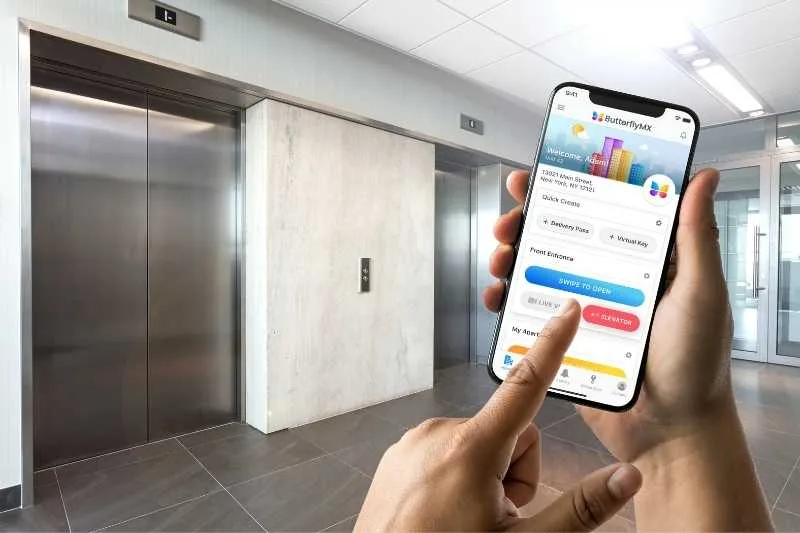Key takeaways
- Revitalization is accelerating the adoption of Cleveland property technology trends in both residential and commercial real estate.
- Proptech solutions like smart access control and centralized management platforms are improving operational efficiency and tenant satisfaction.
- Legacy buildings in Cleveland are staying competitive by integrating IoT devices, automation, and energy-efficient systems.
- Downtown redevelopment projects are using technology to support adaptive reuse and modern tenant expectations.
- Property managers who invest in the right technology today are better positioned to attract residents and streamline operations tomorrow.

Cleveland, Ohio is undergoing a major transformation. Once known primarily for its manufacturing and industrial past, the city is experiencing renewed interest in real estate investment, particularly in its downtown core. With a mix of historic buildings, adaptive reuse projects, and new multifamily developments, Cleveland presents a unique proptech landscape for implementing property technology, or “proptech.”
Revitalization efforts downtown, supported by infrastructure upgrades and business incentives, have made the city more attractive to real estate developers. As a result, the adoption of modern building technologies is accelerating. The need to compete with newer construction, improve operational efficiency, and meet resident expectations is pushing property owners and managers to embrace Cleveland property technology trends and solutions.
In this post:
- What is property technology?
- 5 Cleveland technology trends
- Opportunities and challenges for property managers
- What to consider when upgrading your property technology
- Supporting property tech trends in Cleveland
- Cleveland property technology FAQs
What is property technology?
Property technology refers to digital tools and platforms designed to improve how real estate is bought, sold, managed, and experienced. It spans everything from building management systems and Internet of Things (IoT) devices to smart locks and virtual leasing software.
Proptech includes:
- Smart access control systems. Replaces traditional keys with mobile credentials, PIN codes, or video intercoms. These systems enhance building security while offering residents a seamless, keyless entry experience that can be managed from their smartphones.
- IoT-connected devices. Used for real-time energy monitoring, predictive maintenance alerts, and remote system diagnostics. These tools help property teams optimize utility usage, reduce downtime, and proactively address issues before they escalate.
- Centralized property management systems. Automates core functions like leasing, rent collection, maintenance requests, and communication. These cloud-based platforms streamline day-to-day operations and offer a single source of truth for managing multiple properties or units efficiently.
5 Cleveland technology trends
- Smart access control and security systems
- Centralized property management platforms
- Data-driven decision-making
- Energy efficiency and smart building systems
- Self-guided tours and remote leasing
1. Smart access control and security systems
One of the most significant proptech trends in Cleveland is the shift toward keyless entry and enhanced security systems. Traditional lock-and-key systems are being replaced with mobile-based solutions that offer residents greater convenience and give property managers better control.
Many buildings in Cleveland are now using video intercoms, smartphone-based credentials, and cloud-based access logs. These tools not only improve safety for residents but also streamline visitor access and delivery management.
For property owners looking to modernize older buildings or differentiate new projects, smart access control systems are often one of the first upgrades.
2. Centralized property management platforms
Cloud-based property management platforms are increasingly common across Cleveland’s real estate market. These platforms consolidate operations like rent collection, maintenance tracking, and lease management into a single dashboard, accessible from anywhere.
In Cleveland’s multifamily sector, centralized platforms are particularly useful for property managers who oversee multiple buildings or portfolios. These tools reduce administrative workload, improve tenant communication, and make it easier to respond to maintenance issues in a timely manner.
For commercial properties, the same platforms can integrate with accounting software, enable automated billing, and provide customizable reporting tools that support decision-making at scale.
3. Data-driven decision-making
Real estate professionals in Cleveland are beginning to harness the power of data science to optimize building performance and tenant experience. By tracking everything from utility usage to lease conversion rates, property managers can make informed decisions about capital improvements, staffing, and amenities.
Examples of data-driven tools include:
- Predictive maintenance systems that alert staff before HVAC systems fail
- Utility dashboards that track water and electricity usage by unit
- Tenant satisfaction surveys and sentiment analysis to guide retention strategies
This shift toward data isn’t just about efficiency. It also allows property teams to proactively address issues before they become costly problems.
4. Energy efficiency and smart building systems
Energy efficiency is a top priority in Cleveland’s real estate market, especially with growing interest in sustainability and ESG reporting. Many buildings are investing in LED lighting upgrades, HVAC automation, and solar energy integration.
Smart building systems help reduce operating costs while also supporting compliance with emerging sustainability standards. In a city with a large stock of legacy buildings, proptech is playing a key role in retrofitting properties to meet modern efficiency goals.
These proptech trends are particularly visible in office conversions and adaptive reuse projects, where technology is used to optimize temperature control, monitor emissions, and reduce energy waste.
5. Self-guided tours and remote leasing
Leasing teams in Cleveland are embracing technology that supports both virtual and in-person engagement. Self-guided tours, virtual walkthroughs, and remote application processes are increasingly popular, especially in suburban neighborhoods and workforce housing segments.
These tools are convenient for both prospects and property managers. They allow tours to happen outside of standard business hours and reduce the need for on-site staffing. They also help buildings reach out-of-town renters, a growing trend as more people relocate to Cleveland for work or affordability.
Discover these five property technology trends:
Opportunities and challenges for property managers
Opportunities
- Efficiency gains. One of the most immediate benefits of adopting proptech is operational efficiency. Automating routine tasks like rent collection, maintenance scheduling, and resident communication frees up time for on-site teams to focus on higher-value responsibilities. Property managers can track performance in real time, reduce administrative errors, and streamline processes across multiple buildings, ultimately improving productivity and reducing overhead.
- Enhanced tenant satisfaction. Today’s renters expect more from their living spaces. Features like mobile access control, smart thermostats, and self-service portals make day-to-day life more convenient for residents. In Cleveland’s competitive housing market, these upgrades can lead to higher tenant satisfaction, improved retention rates, and more positive reviews.
- Competitive differentiation. With new developments on the rise and downtown revitalization drawing fresh interest, standing out is crucial. Tech-enabled buildings appeal to modern renters and commercial tenants looking for convenience, connectivity, and sustainability. For owners and managers, investing in proptech creates a clear point of differentiation that positions their properties as modern, forward-thinking, and resident-focused.
Challenges
- Budget constraints. Upfront costs can be a significant barrier, especially for smaller property owners or operators of older buildings. Hardware installations, software subscriptions, and IT support require careful budgeting. While many solutions offer long-term ROI, the initial investment can deter adoption without a clear financial roadmap.
- Training and adoption curve. Introducing new technology requires time, planning, and staff training. Property teams may be unfamiliar with certain tools, and residents may need support to get comfortable with new systems. Without proper onboarding, even the most advanced platforms can underdeliver. Ongoing support and change management are essential to realizing the full value of the tech.
- Integration with other systems. Older buildings often present infrastructure challenges. Legacy wiring, outdated HVAC systems, or lack of high-speed internet can complicate implementation. In some cases, retrofitting or system upgrades are needed before new technology can be deployed, adding time and cost to the project. Ensuring that new tools integrate smoothly with existing systems is key to avoiding operational disruptions.
What to consider when upgrading your property technology
- Compatibility with current systems
- Vendor support and scalability
- ROI and value to residents
- Local infrastructure
Compatibility with current systems
Start by assessing whether the new technology integrates seamlessly with your existing platforms and infrastructure. Tools that work well with your current property management software, access control systems, or accounting platforms will reduce disruption and improve implementation speed. Lack of compatibility can lead to duplicated work, inefficiencies, and unnecessary complexity.
Vendor support and scalability
Select vendors that offer strong customer service, reliable technical support, and clear pathways for scaling their solutions as your portfolio grows. Good vendor support can make a major difference during onboarding and when troubleshooting issues. Additionally, opt for systems that can expand to multiple properties or adapt to future needs without requiring a complete overhaul.
ROI and value to residents
Technology investments should deliver measurable returns. Consider how each solution will impact your operational costs, streamline workflows, or enhance tenant experience. Features that improve convenience, security, or communication can increase resident satisfaction and retention, supporting your bottom line through reduced turnover and higher occupancy rates.
Local infrastructure
Cleveland’s diverse building stock includes everything from historic properties to new high-rises, which can influence your ability to deploy certain technologies. Broadband access, building materials, and layout may all affect the feasibility of new installations. Be sure to evaluate the physical and digital infrastructure at each site before committing to a system.

Supporting property tech trends in Cleveland
As Cleveland embraces modern property technology, ButterflyMX stands out as a leading company with competitive smart access control solutions. Designed with both residents and property managers in mind, ButterflyMX simplifies building access through video intercoms, mobile credentials, and cloud-based management tools.
Whether it’s a downtown high-rise or a renovated multifamily building in Ohio City, ButterflyMX helps Cleveland properties upgrade their access control systems without expensive wiring or hardware overhauls. What’s more, property managers can grant access remotely, view time-and-date-stamped audit logs, and integrate the system with leading property management platforms, all from a single dashboard.
By offering a scalable and user-friendly solution, ButterflyMX supports many of the core trends shaping Cleveland real estate today, including improved security, operational efficiency, and a better resident experience.
Cleveland property technology FAQs
- How is downtown Cleveland’s revitalization affecting property technology adoption?
- How have trends in technology affected housing in Cleveland?
How is downtown Cleveland’s revitalization affecting property technology adoption?
By integrating smart systems and digital tools, property managers are creating more efficient building operations while delivering the convenience and amenities today’s tenants expect.
How have trends in technology affected housing in Cleveland?
Technology has enabled more efficient leasing, improved building security, and allowed older properties to compete by adding smart features and automation. These advancements have also enhanced the resident experience, making properties more attractive to renters who prioritize convenience, connectivity, and sustainability.

Get your free quote!
Fill in the form below, and we'll email you right back.
Want a free quote?
Fill in the form below, and we'll email you right back.
You’ll be redirected shortly...






